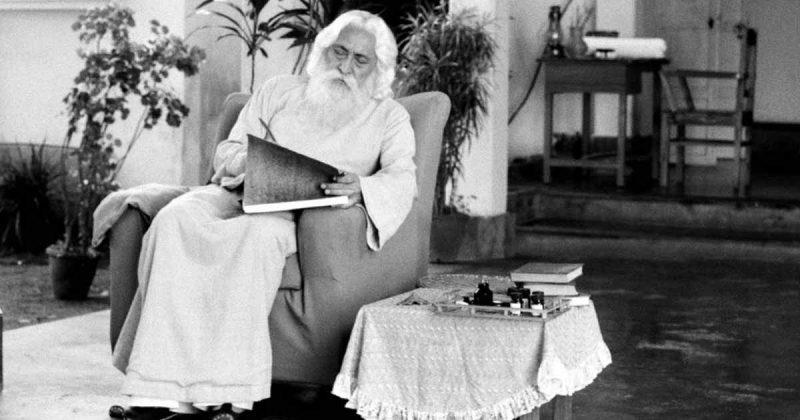August 7 marks the death anniversary of Nobel laureate Rabindranath Tagore. He was a Bengali poet, novelist, musician, painter, and playwright who significantly transformed Bengali literature and music. Suffering from acute uraemia and a blockage in his urinary bladder, he passed away at the age of 80 on August 7, 1941.
About Rabindranath Tagore
- Tagore was born May 7, 1861 at the Jorasanko mansion in Calcutta. He was the youngest of 13 surviving children of Debendranath Tagore and Sarada Devi.
- He composed over 2,000 songs which created a separate genre, known as “Tagore songs”. His collection of poems, Gitanjali, created a paradigm shift in Bengali literature, while his songs did the same to Bengali music.
- He also wrote eight novels, 84 short stories and numerous poems in his prolific literary career spanned over almost seven decades. Gitanjali, Gora and Ghare-Baire are his best-known works.
- His compositions were chosen by two nations as national anthems: Bangladesh’s “Amar Shonar Bangla” and India’s “Jana Gana Mana“.
Rabindranath Tagore’s Titles
Recognized as the “Bard of Bengal” due to his profound impact on literature and music, Rabindranath Tagore was also affectionately known by a variety of endearing titles. Among these were “Gurudev“, “Rabi”, “Rabikaka”, “Kabiguru”, and “Biswakabi”.
Top 5 Rabindranath Tagore Books
Gitanjali
- First published in 1910, “Gitanjali” underwent Tagore’s English translation by 1912, resulting in a compilation of 103 prose poems. This collaborative effort involved W. B. Yeats as a co-author.
- Drawing inspiration from medieval devotional songs, Tagore’s verses focus on the theme of love and are characterized by a rhythmic, almost musical quality that evokes a sense of faith in the reader.
The Postmaster
- Written in solitude, “The Postmaster” established Tagore’s renown as a prolific writer with a romantic inclination.
- Interwoven with intricate themes, the storyline adeptly displays the purity of childhood against the intricacies of grown-up life.
- The novel delves into the dualities of urban and rural existence, while also exploring the interplay between the ordinary and the supernatural.
Gora
- “Gora” serves as a testament to Tagore’s visionary perspectives, as it delves into profound societal matters by addressing entrenched social issues. The narrative courageously challenges religious, social, and political norms prevalent in Bengal during the 1880s.
- The protagonist, Gora, brings forth philosophical inquiries, engaging in debates concerning politics, theology, female rights, gender, universal brotherhood, and freedom.
- Notably, Tagore’s timeless analysis of time, still remains relevant in today’s modern society.
Ghare Bhaire (The Home and the World)
- For an exploration of India’s colonial history, “Ghare Bhaire” is a renowned work among Tagore’s collection.
- Comprising 10 essays and short stories, the book delves deeply into colonial India’s national and historical processes.
- Unique in its approach, the work stimulates discussions on lesser-explored topics, presenting conflicting ideals through two remarkable protagonists.
Chokher Bali
- A pioneer of modern Indian novels, “Chokher Bali” offers intricate writing and complex relationship dynamics.
- The narrative delves into themes such as widows’ treatment, child marriage, and women’s education during the 19th and 20th centuries.
- Implicitly debating morality and love, the characters transcend societal norms and perspectives, inviting readers into a profound understanding of Bengali society.
Awards won by Rabindranath Tagore
List of Awards won by Rabindranath Tagore:
| Award | Details |
|---|---|
| Nobel Prize | In 1913, Rabindranath Tagore was honored with the Nobel Prize for Literature, recognizing his collection “Gitanjali,” initially published in London in 1912. |
| Knighthood | In 1915, Rabindranath Tagore received a knighthood, by King George, however, his strong protest against the Jallianwala Bagh massacre on April 13, 1919, led him to renounce the title on May 31, 1919. |
| Doctorate of Literature | In 1940, Rabindranath Tagore was honored with a Doctorate of Literature from Oxford University as a testament to his profound literary and intellectual impact. |
Key takeaways for competitive examinations
- Rabindranath Tagore was awarded The Nobel Prize in: 1913



 Indian Olympic Medal Winners List Till N...
Indian Olympic Medal Winners List Till N...
 Who is the Inventor of the Gramophone?
Who is the Inventor of the Gramophone?
 HS Dhaliwal Appointed New DGP Of Andaman...
HS Dhaliwal Appointed New DGP Of Andaman...
